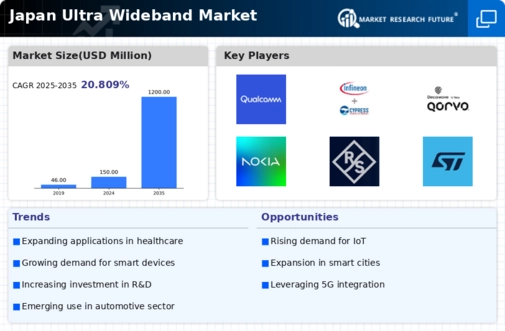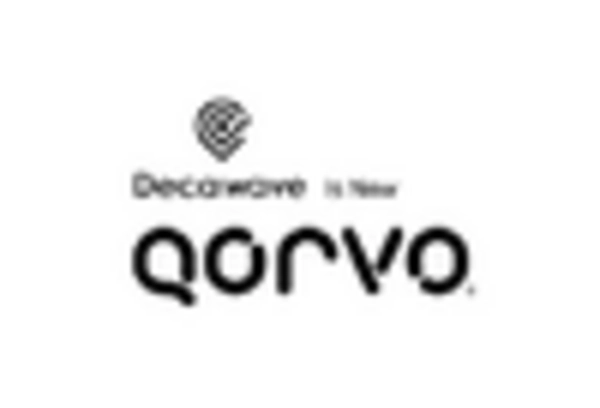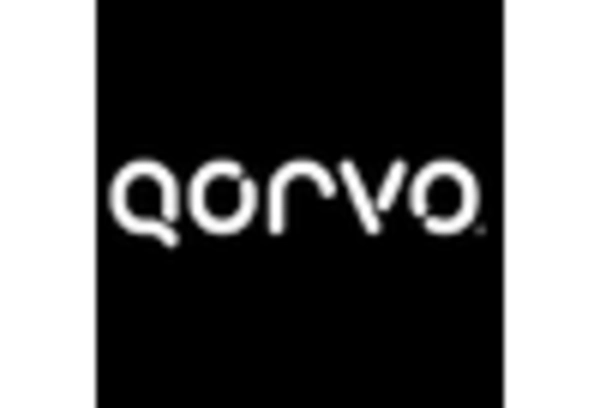Advancements in IoT Connectivity
The ultra wideband market in Japan is poised for growth due to advancements in Internet of Things (IoT) connectivity. As IoT devices proliferate across various sectors, the need for reliable and high-speed communication becomes paramount. Ultra wideband technology offers low power consumption and high data rates, making it suitable for connecting numerous devices seamlessly. This capability is particularly relevant in industrial automation and smart home applications, where multiple devices need to communicate efficiently. The ultra wideband market is likely to capitalize on this trend, as the number of connected devices in Japan is expected to exceed 1 billion by 2026. This growth presents a substantial opportunity for ultra wideband solutions to enhance IoT ecosystems.
Increased Focus on Security and Privacy
In Japan, the ultra wideband market is witnessing a heightened focus on security and privacy concerns. As data breaches and cyber threats become more prevalent, organizations are prioritizing secure communication technologies. Ultra wideband's inherent characteristics, such as its ability to provide secure data transmission and resistance to interference, make it an attractive option for businesses looking to safeguard sensitive information. The ultra wideband market is likely to see increased adoption in sectors such as finance and healthcare, where data security is paramount. Recent surveys indicate that approximately 70% of Japanese companies are planning to invest in advanced security technologies, which could drive demand for ultra wideband solutions.
Integration with Smart City Initiatives
Japan's commitment to developing smart cities is fostering growth in the ultra wideband market. The integration of ultra wideband technology into urban infrastructure is seen as a pivotal step towards enhancing connectivity and efficiency. Smart city projects often require advanced communication systems for traffic management, public safety, and environmental monitoring. Ultra wideband's ability to provide high-speed data transmission and precise location tracking makes it an ideal candidate for these applications. As municipalities invest in smart technologies, the ultra wideband market stands to benefit significantly. Reports suggest that investments in smart city initiatives in Japan could reach upwards of $100 billion by 2030, creating a fertile ground for ultra wideband solutions to thrive.
Rising Demand for Precision Location Services
The ultra wideband market in Japan experiences a notable surge in demand for precision location services. This demand is primarily driven by the increasing need for accurate positioning in various sectors, including logistics and retail. Companies are seeking to enhance operational efficiency through real-time tracking of assets and personnel. The ultra wideband technology offers accuracy within centimeters, which is significantly superior to traditional GPS systems. As a result, businesses are investing in ultra wideband solutions to improve their service offerings. According to recent estimates, the market for location-based services in Japan is projected to grow at a CAGR of approximately 15% over the next five years, indicating a robust opportunity for the ultra wideband market to expand its footprint in this domain.
Government Support for Technological Innovation
The ultra wideband market in Japan benefits from strong government support for technological innovation. The Japanese government has implemented various initiatives aimed at promoting research and development in advanced communication technologies. This support includes funding for startups and established companies working on ultra wideband applications. Additionally, regulatory frameworks are being developed to facilitate the deployment of ultra wideband technology across different sectors. The ultra wideband market is likely to gain momentum as these initiatives encourage collaboration between public and private sectors. With government investments in technology expected to reach approximately $20 billion by 2027, the ultra wideband market is well-positioned to leverage this support for growth.















